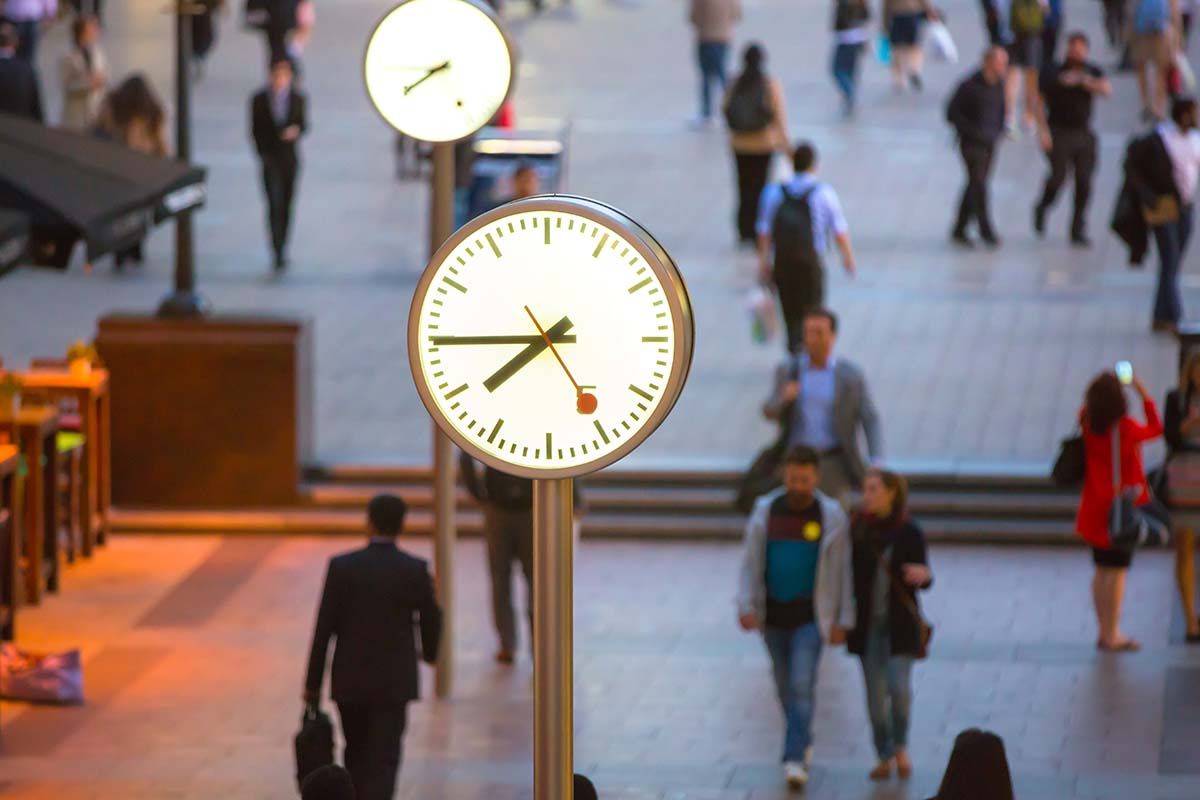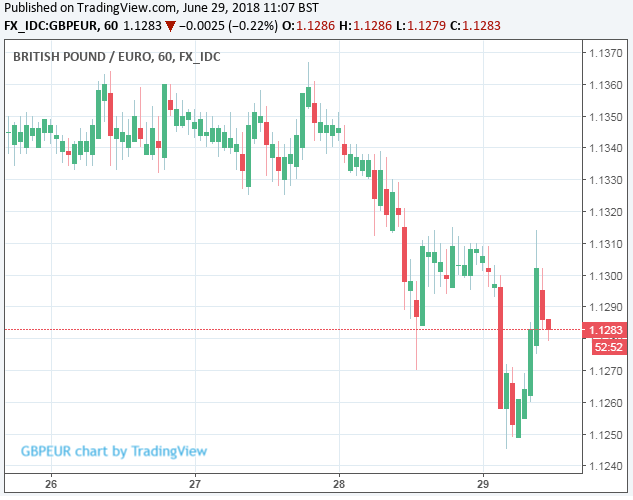Respite for Pound Sterling on GDP Upgrade + Better-than-Expected Service Sector Stats
- Written by: James Skinner

© IRStone, Adobe Stock
The Pound advanced against the Dollar and pared deep losses against the Euro ahead of the weekend after the Office for National Statistics upgraded its quarter-one GDP estimate.
Office for National Statistics data showed the UK economy grew by 0.2% during the three months to the end of March which, although down from 0.4% in the final quarter of 2017, was ahead of the 0.1% expansion previously announced by the ONS.
Friday's revision of the earlier number comes after more complete data showed the recession in the UK construction industry deepened by less than was previously thought. Previously the ONS had said construction output fell by 2.7% during the first-quarter, although on Friday it told markets the fall was actually much smaller, at just -0.8%.
However, and on the downside, the earlier estimate of industrial production was revised lower after the ONS overestimated growth in energy and manufacturing production for the period. Output from the UK's manufacturing sector actually fell by 0.1% in the first quarter while energy production grew by just 1.4%, down from an earlier estimate of 2.5%.
The UK's dominant services industry contributed the lion's share of growth, with output from the sector rising by 0.3% only for it to be partially offset by the fall in construction. Although this expansion was meagre by historic standards, more timely data released Friday showed the UK's largest economic sector saw out the April month in better condition than many had expected.
Seperatley, the Index of Services report showed output from the sector rising by 0.2% during the three months to the end of April, which was its slowest expansion since the three month period to the end of November 2017 but nonetheless, was faster than the 0% expansion that most economists had forecast.
Growth for April alone was even faster, coming in at 0.3%, suggesting the economy regained some momentum in the second quarter. It is this beat against expectations that analysts say helped Sterling reverse course against the Euro and Dollar after a difficult week for the respective exchange rates.
"Overall, then, we remain cautiously upbeat about the economy’s near-term prospects and continue to think that the MPC will press ahead and raise interest rates at its next meeting on 2nd August," says Ruth Gregory, a senior UK economist at Capital Economics.

Above: Pound-to-Dollar rate shown at hourly intervals shows a spike following the release of GDP data at 09:30.
The Pound was quoted 0.68% higher at 1.3165 against the Dollar following the release while the Pound-to-Euro exchange rate pared earlier losses to trade just 0.06% lower at 1.1302.
The GBP/EUR exchange rate has been under heavy selling pressure over the course of the past 24 hours and Sterling bulls will hope the cessation of month-end flows when combined with the data might put a floor under the sell-off.

Above: Pound-to-Euro rate shown at hourly intervals.
Currency markets care about the GDP data because it reflects rising and falling demand within the UK economy, which has a direct bearing on consumer price inflation which is itself important for questions around interest rates. And interest rates themselves are a raison d'être for most moves in exchange rates.
Changes in interest rates, or hints of them being in the cards, are only made in response to movements in inflation but impact currencies because of the push and pull influence they have on international capital flows and their allure for short-term speculators.
Advertisement
Get up to 5% more foreign exchange by using a specialist provider to get closer to the real market rate and avoid the gaping spreads charged by your bank when providing currency. Learn more here
Separately, but also on the downside, the ONS said Friday that business investment fell further than was previously thought at the beginning of the year. Investment by companies shrank 0.4% during the first quarter, extending a 0.2% decline seen in the final three months of 2017, which is a steeper fall than the 0.2% previously reported.
Business investment, and investment more generally, declined across all categories during the period. Not only did companies cut back their spending on new capital equipment and other items, but government and households too, with "gross fixed capital formation" falling 1.3% to £85.6 billion.
"April’s index of services data suggest that the risk to the MPC’s forecast that GDP will rise by 0.4% in Q2 lie to the downside...Three-month on three-month growth in the ONS’ new monthly GDP series is on track to be just 0.1% in May," says Samuel Tombs, chief UK economist at Pantheon Macroeconomics. "This will be the latest data the MPC has at its key August meeting and we doubt that such modest growth will persuade a majority of MPC members that they need to raise Bank Rate immediately."
Tombs and the Pantheon team say UK economic growth will rise to only 0.3% during the second quarter and that this will be insufficient for the Bank of England (BoE) to feel comfortable raising interest rates on August 02. They forecast the Bank will not raise rates again until 2019.
Bank of England in Focus
The first-quarter economic slowdown, and a steep decline in UK inflation, already led the BoE to abandon the idea of an interest rate rise in May. This dented the Pound and left markets looking to the August meeting for the next possible move.
"I would have voted to raise Bank Rate at the MPC’s May meeting had data on the economy held firm. What we saw ahead of that meeting was a string of weak data suggesting consumer spending might be faltering," says Andy Haldane, chief economist at the BoE and a member of the Monetary Policy Committee (MPC), in a speech Thursday. "I believed there was option value in waiting to see if these data signalled the start of a lasting retrenchment by households, or were instead a temporary snow or statistical blip."
Haldane was one of three MPC members to have voted in June for an increase in the UK's main interest rate, after eschewing such a decision in May. Many economists now expect the Bank of England will go ahead and raise rates in August, although financial markets have been slow to take note.
Sterling-Overnight-Index-Average pricing on the morning of Thursday 28 June implied and August 02 Bank Rate of 0.59%. If markets were as confident in the likelihood of an August rate rise as Andy Haldane appears to be in the merits of one then that implied rate would be closer to the 0.75% the actual Bank Rate will sit at the next time the BoE pulls the trigger.
If and when financial markets become more willing to bet on an August interest rate rise then this implied rate will rise further, and the Pound with it.
Advertisement
Get up to 5% more foreign exchange by using a specialist provider to get closer to the real market rate and avoid the gaping spreads charged by your bank when providing currency. Learn more here




